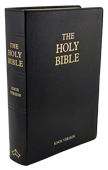The Holy Bible – Knox Translation
The Book of Wisdom
|
Chapter 16
|
1
Fittingly, then, were the Egyptians plagued by such beasts as these, that swarmed to their undoing.✻
2
Thy own people no plague befell; pined their queasy stomach for dainties, thou wouldst feed them on quails.
3
Though hunger drove them to food, the men of Egypt turned away with loathing from the necessaries they craved, so foul the sight of the frogs that came to punish them. Thy own people should go wanting for a little, only so as to prepare them for the dainties that would follow.
4
Their oppressors must feel the pinch of poverty; for themselves, the sight of another’s chastisement should be lesson enough.
5
When they themselves encountered brute malice, and the bites of writhing serpents threatened them with destruction,
6
thy vengeance did not go to all lengths; enough that they should be warned by a brief experience of distress; they should be put in mind of thy law, yet have the assurance that thou wouldst come to their rescue.
7
For indeed, he who turned to look did not win safety from the brazen serpent which met his eyes, but from thee, who alone canst save.
8
No better proof could our enemies have, that from all peril thou alone deliverest.
9
Bite of locust or sting of fly was the undoing of them; no salve could be found against the mortal punishment they had deserved.
10
And here were these sons of thine, unvanquished even by the teeth of venomous serpents, because thy mercy came out to meet them and gave relief.
11
They must feel the prick, to remind them of the commandments they had from thee, and then quickly be rescued before they sank into deep lethargy, beyond the reach of thy succour.
12
Herb nor plaster it was that cured them, but thy word, Lord, that all healing gives.
13
Lord of life as of death, thou canst bring us down to the grave and back from the grave;
14
thine is not the fatal stroke man deals in spite, that banishes life beyond recall, imprisons the soul for ever.
15
Truly, thine is a power there is no escaping;
16
the uplifted arm that plagued impious Egypt, where thou wast treated as a stranger. Strange, indeed, to that country were the rains that hunted them down, the fierce hail-storms; the fire, too, that wasted them.
17
Wonder beyond all wont, that in water, the all-quenching, fire should rage its fiercest; no element but must rally in the cause of right.
18
Here the flame would burn low, to spare those creatures a scorching, that were thy emissaries against the godless; doubt there should be none, for any who saw it, but divine justice was at his heels.
19
Here, in the very midst of the water it would burn as never fire burned yet, to blast all the fruits of that accursed land.
20
And thy own people, Lord? Them thou didst foster with the food of angels; bread from heaven thou didst set before them, which no labour of theirs had made ready, every taste uniting that could bring content, of every appetite the welcome choice.
21
So would thy own nature manifest a father’s universal love; this food should humour the eater’s whim, turning itself into that which he craved most.
22
In Egypt, snow and ice had resisted the fire, never melting; plain it was that this fire, which shone out amid the hailstones and the rain, was in alliance with them to burn up and destroy the enemy’s harvest.
23
Now, once again, fire forgot its own nature, this time, to give faithful souls their nourishment!✻
24
So well does thy creation obey thee, its author, now exerting all its powers to punish the wicked, now abating its force to do thy loyal followers a service!
25
Why should nature, seconding that universal bounty of thine, go to all shifts to meet the needs of thy suppliants,
26
but for the instruction of thy own children, Lord, children so well beloved? They were to learn that man lives, not by the ripening of crops, but by thy word, ever protecting the souls that trust in thee.
27
This manna, that never shrank from the fire while it was a-cooking, would melt before the heat of the sun’s first feeble ray.
28
What meant this, but that we must be up before the sun to give thee thanks, seeking thy audience with day’s earliest light?
29
Thankless if a man be, like the hoar frost of winter his hopes shall dissolve; like water that goes to waste they shall vanish.


